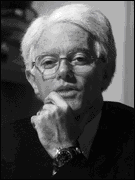
...
Munger answers questions alongside Buffett for hours each May at the Berkshire shareholders meeting in Omaha, Neb., and again on his own at the annual meeting in California of Wesco Financial Corp., a Berkshire subsidiary that he leads.
Buffett sometimes relies on Munger to repeat questions because his hearing is better. After one shareholder asked a lengthy question this year about how Buffett got started investing and what mindset an investor should have, Buffett turned to Munger for help.
So Munger summed it up: "He wants you to instruct him how to become less like a lemming."
When Munger does weigh in, he often cuts through Buffett's longer answer to its heart. And sometimes he critiques Buffett's response.
"Well, that was real useful advice," Munger said this year after Buffett answered a question about choosing good managers by saying Berkshire buys businesses with strong management teams in place. Then he compared that to saying the best way to get through lean times is to keep a couple million dollars lying around.
...
Direct Link - Berkshire's No. 2 man helps from the background.
 Michael Mauboussin's latest article about "The Failure of Arbitrage - Leverage, Liquidity, and the Persistence of Inefficiency".
Michael Mauboussin's latest article about "The Failure of Arbitrage - Leverage, Liquidity, and the Persistence of Inefficiency". Key Takeaways:
Key Takeaways:
 ...
...









 Mark Sellers's latest article on FT's Inside Curve column.
Mark Sellers's latest article on FT's Inside Curve column. Despite recent concerns facing Wall Street, some investors are saying opportunity remains, with Leon Cooperman, Omega Advisors Chmn. & CEO and CNBC's Maria Bartiromo.
Despite recent concerns facing Wall Street, some investors are saying opportunity remains, with Leon Cooperman, Omega Advisors Chmn. & CEO and CNBC's Maria Bartiromo.
 Listen to interviews with Fidelity mutual fund portfolio managers as they share investment strategies, expectations and market analysis.
Listen to interviews with Fidelity mutual fund portfolio managers as they share investment strategies, expectations and market analysis.

 Morningstar chats with Chris Davis and Ken Feinberg of The Davis Funds.
Morningstar chats with Chris Davis and Ken Feinberg of The Davis Funds.




